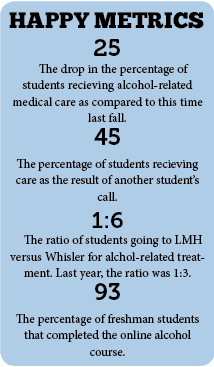By Laurel Kennedy
Vice President of Student Development
What a difference a year makes. At this time last year, we had done several communications with the campus and key constituencies to say that alcohol and vandalism were presenting unusual problems.
In fact, the sixth week of school last year was the first week of the year when we did not transport at least one student to the hospital. This year, most weeks have been without any transports.
Alcohol has not, of course, disappeared from campus. Far from it. The number of students walking around with open cans of Natty Light is, well… an embarrassment to anyone who appreciates good beer. It’s been a lot of students.
But consider that while students continue to be stopped with open containers, the number charged with disorderly conduct has dropped from five last year to just one so far this year. We have had not a single report of students being abusive to medical personnel.
These are all good signs. They correspond with a different campus vibe. To have so few sirens is itself a notable difference.
What accounts for these changes? It would be great to hear what students’ thoughts are about this. I’ll suggest a few possibilities.
First, we think that the Class of 2017 was better prepared to encounter the college alcohol scene. More of these students—93%–completed the on-line alcohol course we expect students to take, for example.
We know that the course is not the most exciting use of one’s time, but we also know empirically that it makes a difference in what happens for first-year students. (By the way, we are reviewing options to see if there is a more interesting course out there.)
Second, we know that most students who choose to drink do so moderately, and most don’t particularly like or want an unhealthy alcohol environment. Their moderation is more evident this year than last.
This is better not just for them, but also for students whose idea of fun doesn’t include alcohol at all, or not always. These students seem to be crafting the social environment they want, too.
Third, it appears that hosts and servers are acting with greater responsibility, perhaps in association with Party Registration or perhaps because they feel better equipped to look out for their guests’ safety and wellbeing. One of the best attributes of Denison students as a whole is how they look out for each other. Fewer students may be reaching the point of overdose.
And fourth, friends and neighbors may be intervening earlier, before a medical emergency becomes dire. Having an Emergency Medical Technician (EMT) on campus makes everything related to medical intervention easier. When most students are being sent to Whisler rather than LMH, students contemplating a call for assistance can feel comfortable that there won’t be unnecessary expense or other repercussions.
This is especially important in situations of uncertainty: Is the situation “bad enough” to ask for a medical assessment? Barriers to calling are lower when you know your friend won’t go to the ER unless medically warranted. This is how our Medical Assistance program is supposed to work. (A post next week on the Student Development blog will share findings from an evaluation of the Medical Assistance policy: http://blogs.denison.edu/commons/.)
Finally, there has been a lot to do on campus on the weekends. This continues to be an area that we’re working on, with partners across campus. October offers no shortage of entertainment with an Inaugural Ball and D-Day still ahead.
It’s a very good start.

